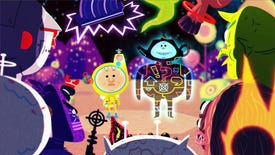Wot I Think: Loot Rascals
Scottish spacebabies
I suspect that everyone who makes games wishes they'd made Spelunky. Effectively perfect game design, unconstrained by the heavy flab of spectacle. Loot Rascals [official site] takes that game's random generation, escalating challenge, extreme balancing, minimal explaining and daily runs and applies it all to a slick, playful roguelite and collectable card game hybrid. Then slathers gloriously weird creature design all over it.
Aesthetically and tonally, it puts me a little in mind of the Katamari games - that point where what would, in the wrong hands, be mere random wackiness tilts successfully into surreal joy. Weirdo creatures, order-givers who straddle the line between chummy and malevolent and, rather than a king in tight tights, we get a laconic Scottish astronaut with a baby's face and a space-teapot on his head. This is a delightfully-presented game, and though many of its sights and sounds are entirely arbitrary, it always stops short of annoying. Folk from the likes of Adventure Time, Hohokum and Alphabear contributed to development, and boy does that collective expertise and ingenuity show.
Here's the deal. You're a spaceperson yourself, traipsing across various planetary landscapes divided into hexes and patrolled by the titular Rascals, whom you must clobber or be clobbered by. Combat is turn-based and activates whenever you share a space with an evil egg, a girl who shouts 'bolus', a clanky robot, a three-eyed Chewbacca or whatever wonderful oddity you've bumped into.
By and large, victory is decided by having sufficient attack power and defence power, and this is determined by the cards you have equipped. Blue ones add to your defence points, orange ones add to your offence, and any one may have bonus abilities that confer extra points to other cards, depending on where exactly you place them.
Card placement is half the game here - the maths of working out what arrangement maxes out your stats, and making painful decisions about what cards to bench because they don't take advantage of some other bonus. Number goes up, number goes down, wait a minute, number goes WAY up. The combinations are impeccably well-balanced, with cards often having fiendish negative effects such as -2 if it's in on the bottom row or docking a point from every card of the same type.
Basically, what this means is that you're constantly swapping stuff out, not sitting pretty with The One True Deck, and unlike a Diablolike, a new card can have a dramatic rather than subtle effect on your numbers. If there was a way to sit there with an infinite deck of cards, endlessly fiddling in pursuit of the biggest number possible, I fear I would lose a whole day to it.
Winning a fight might randomly drop a new card, and it's this which is the main spur to head off into dangerous territories, further and further flung from the small dome that acts as your base. Loot! But, Rascals! As far as I can tell, the Rascals are to some extent entirely randomly-generated in threat as well as type, but it does seem as though you're more likely to run into beefier ones if your own stats are fairly high.
The true terror of death is that you lose all your cards if you lose a fight. You'll resurrect (unless you're playing the one shot and done daily challenge mode) but you'll be puny; though the initial monsters you'll then encounter are puny too, goddamn but you'll miss those beautiful cards you had a minute ago. A few minutes later, of course, all you care about is the new cards in your hand now.
It's one of those games where death happens fast if you don't exercise due diligence. You only have five hitpoints (though some cards can temporarily increase this) and it's more than possible to lose all of these in the space of one fight. Including against embarrassingly weak foes. Avoiding this means watching the numbers carefully, and keeping a close eye on Loot Rascal's other key mechanic, which is that it flips from day to night and back again every half-dozen turns.
Some monsters get to attack first at night, others in the day, and attacking first is what this game is really all about. If your attack's high enough you can often take out an enemy in one hit, while facing the occasional random miniboss (also randomly-named, as in Diablo) is no longer a guaranteed death sentence.
I'm aware I've spent most of this piece describing mechanics rather than offering opinions as such, and this is because that's what Loot Rascals is underneath its gonzo, capering skin - a game of mechanics. Easy to learn, difficult to master mechanics, which you can never take your eye off. That it feels entirely like its own true-blue videogame and not like an adaptation of a CCG is testament to how cleanly all its many moving parts slots together. This is such a slick wee thing.
There's another neat feature somehow squeezed into this Jenga tower of ingenuity, whereby baddies rob a card from you if they beat you, and other players may then find that card by defeating bosses in their own games. And you, of course, might find their lost treasures, at which point you can decide whether to send it back to them or keep it. This has only happened to me a couple of times - I think the playerbase needs time to build up - but apparently this can result in rewards or payback, which I have not yet experienced. Probably because I die too quick. A lovely idea and one that, I suspect, will make more difference the more you invest in this.
Even so, I did feel as though I'd seen all the game was fairly early on - that it would be a matter of finessing my skills far more than it would be a voyage of discovery. While that's true of Spelunky too, it did hook new players on the mystery of what might lie ahead, the increasing weirdness and menace of later areas, before, for some of us, becoming a ritual test of skill. See also The Binding Of Isaac, which this also has a few commonalities with.
There's a loose, comic story about rebuilding a big robot wrapped around the thing, but really it immediately becomes about endlessly bettering yourself. Leaderboards and daily challenges and all that jazz - long-term investment. Catnip for many people, but I don't know that it got its hooks in deep enough to trigger that impulse in me.
Though Loot Rascals has been deeply charming for a couple of days, I can't see myself returning to it over and over in that way. That said, the daily challenges do save it from an otherwise open-ended feel - each new area reached or mega-card found feels that much more momentous when death is absolute, rather than an inconvenience.
Funny, strange, sweet, accessible, as intricate as a Gordian knot with it. Loot Rascals is a smart piece of game design executed with delightful style. Even so, it feels as though the mechanics overwhelm all else - I do think it would benefit from offering more structure and goals in order to then earn the daily-play status it clearly desires.
Loot Rascals is out now on Windows via Steam, Humble and Itch for £11/$15/€15.


















